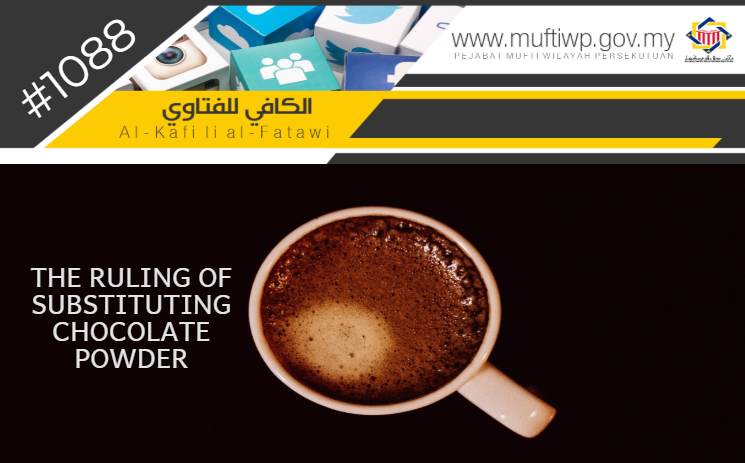
Question:
Assalamualaikum Dato’ Seri Mufti. What is the ruling for a café owner to substitute Milo powder with a cheaper chocolate powder to increase his profit? Hope for an explanation from Dato’ Seri Mufti. Thank you.
Answer:
Waalaikumussalam wbt,
Alhamdulillah, praise and thanks to Allah for the countless blessings He has blessed us all with. Blessings and salutations to the Prophet Muhammad PBUH, his wives, his family, companions and all those that follow his teachings to the day of judgement.
Trade transaction in Islam is permissible. Islam does not prohibit its followers from getting great profit through trade. However, Islam set a clear guideline so that the trade is in line with syarak.
Among the valid conditions of trade is mutual consent from both the buyer and seller. Allah SWT state:
يَا أَيُّهَا الَّذِينَ آمَنُوا لَا تَأْكُلُوا أَمْوَالَكُم بَيْنَكُم بِالْبَاطِلِ إِلَّا أَن تَكُونَ تِجَارَةً عَن تَرَاضٍ مِّنكُمْ
“O you who have believed, do not consume one another's wealth unjustly but only [in lawful] business by mutual consent.”
Surah al-Nisa’ (29)
Syeikh al-Maraghi said: Trade must be performed based on the principle of mutual consent from both the buyer and seller. Hence, fraud, lie and fabrication are prohibited in trade.
The meaning of unjustly in the above verse means taking the property of others without a proper payment or consent of its owner, or through deception. (See: Tafsir al-Maraghi, 3/1168-1169)
In a hadith from Abu Said al-Khudri, the Prophet PBUH said:
إِنَّمَا الْبَيْعُ عَنْ تَرَاضٍ
"The Messenger of Allah (ﷺ) said: 'Transactions may only be done by mutual consent."
Sunan Ibn Majah (2185)
Permissible trade will result in the implication of the change of ownership on the condition that it has the mutual consent of both the buyer and seller. It’s different for a forced trade. The trade is invalid and the seller still have ownership over the property. If a trade fulfils the conditions set by syarak and outwardly both parties agreed to the trade, then it is considered valid, for it is impossible to determine real consent for it is hidden in one’s heart. (See: Masabih al-Tanwir 'ala Sahih al-Jami' al-Saghir, 1/425)
In a hadith narrated by Abu Hurairah RA:
أَنّ رَسُولَ اللّهِ صلى الله عليه وسلم مَرّ عَلَى صُبْرَةِ طَعَامٍ، فَأَدْخَلَ يَدَهُ فِيهَا، فَنَالَتْ أَصَابِعُهُ بَلَلاً. فَقَالَ: "مَا هَذَا يَا صَاحِبَ الطّعَامِ؟" قَالَ: أَصَابَتْهُ السّمَاءُ يَا رَسُولَ اللّهِ! قَالَ: "أَفَلاَ جَعَلْتَهُ فَوْقَ الطّعَامِ كَيْ يَرَاهُ النّاسُ، مَنْ غَشّ فَلَيْسَ مِنّي
The Messenger of Allah (ﷺ) happened to pass by a heap of eatables (corn). He thrust his hand in that (heap) and his fingers were moistened. He said to the owner of that heap of eatables (corn): “What is this?” He replied: “Messenger of Allah, these have been drenched by rainfall.” He (the Holy Prophet) remarked: “Why did you not place this (the drenched part of the heap) over other eatables so that the people could see it? He who deceives is not of me (is not my follower).”
Sahih Muslim (102) and Sunan al-Tirmizi (1315)
The prohibition against deception in trade is clear in the above hadith. The act of changing Milo powder with other cheaper chocolate powder for a greater profit without the knowledge of the buyer is a form of deception and fraud in business. One of the valid conditions of trade is that both buyer and seller know clearly regarding the item on sale. (See: al-Fiqh al-Manhaji, 6/13). In this situation, the buyer is unaware of the substitution and will only realize the fact after he receives the drink. Thus, it is prohibited.
In Islam, the concept of profit in business is not through deception or trickery, but through mutual consent. If deception happens in a trade, surely, the buyer will not want to buy anything from the seller again. Profit in business can also be achieved through one’s competency and skills in business.
Conclusion
To conclude, it is prohibited and sinful to substitute Milo with other chocolate powder without the knowledge of the customer. The reason is, there is element of deception and oppression to the buyer who did not receive the drink that he is paying for. Furthermore, one of the valid conditions of trade is that both parties (buyer and seller) to have a clear knowledge as to the item on sale without any of its hidden defects. Thus, the above-stated situations happen, then the seller is considered as to have deceive the buyer and the trade is invalid.
We advise café owners to have the determination of striving to gain the blessings in seeking sustenance as we supplicate everyday when we are reciting the qunut in our prayer:
وَبَارِكْ لَنا فِيمَا أَعْطَيْتَ
“And confer blessings upon him in everything Thou hast bestowed upon him.”
May the explanation given open our minds and give us understanding in Islam in the future. Amin.

